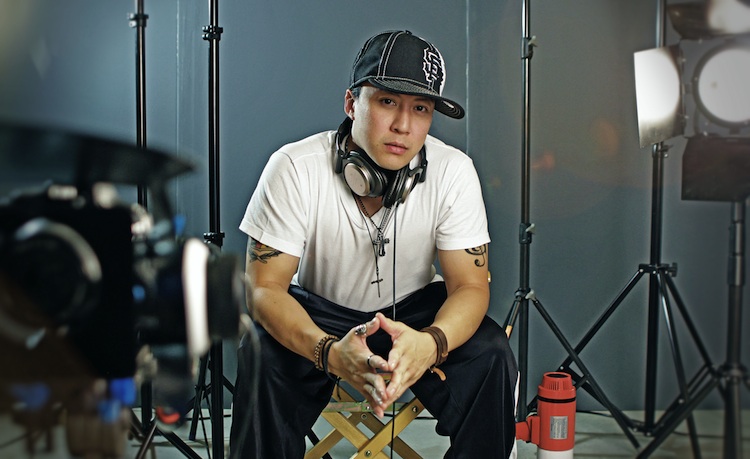
Teddy Gyi, wassup man? How you living?
I’m good! Always savoring life. Thanks for having me on the program!
We’ve known each other a while, but it’s the first time we’ve ever collaborated on anything. For those who don’t know, share how you got involved with FSC, and how you came about the topic.
When I first saw “FSC,” I instantly fell in love with it. All of us have experienced those life-defining moments while conversing in a car, so it’s easily relatable for the audience. It also reminded me of all the great car moments in cinema history, like Brando in “On The Waterfront.” I’m a huge fan of those types of scenes. No tricks to fall back on – just pure, raw dialogue between human beings. It’s a true writer’s arena. So when “FSC” approached me to write an episode, I jumped at the opportunity.
I originally came up with about a dozen plot ideas and submitted them to the producers. Of all the ones I came up with, they asked me to go ahead with “Not a Mistake.” I was a bit nervous about writing this scene because I knew I’d have to really dig deep into my imagination to come up with character cores and a dialogue that was both interesting and believable. But it all worked out, and you guys did an amazing job filming it.
Growing up with a lot of sisters, do you think parents have an easier time having “ the sex talk” with girls than they do boys? Or is it just a difficult conversation for a lot of people period?
It becomes a difficult conversation when no forum of truly open communication exists between parent & child. Unfortunately, culture and religion can sometimes create serious roadblocks to honest communication. “Not a Mistake” is the conversation I wish my mother or father would have had with me when I was a teen. But my parents’ cultural and religious background made any sort of open, candid conversation about sex virtually impossible. It was basically boiled down to “don’t have sex until you’re married, because it’s bad.” And that was the end of it. In my opinion, this is the most ineffective stance in existence. I never really understood the approach of criminalizing sex. Good people have sex every day. It’s a normal function of nature.
Instead of pointing fingers and preaching orders, we should really focus on teaching young people to respect both themselves and their partners. In my opinion, this is what matters most. In “Not a Mistake,” Claire has had her fair share of bad experiences and bad relationships. Marvin’s father is an absentee. He should take these kinds of things into consideration in handling his relationship with Shelly. When Marvin finally understands that his mother was also once that girl, going to her first dance, that’s where a mutual understanding is reached.
I know you’re not an expert on the subject, but you do have experiences. when you were growing up where did guys get information around dating?
In school, they taught us the pure biological aspects of “reproduction.” I don’t remember being taught anything beyond that, such as how sex applies to dating and the dynamics of interpersonal relationships. Nobody wanted to honestly address the fact that teens have sex. Teens have had sex since the beginning of time. But the topic was swept under the rug.
So growing up, we got most of our information from our own experiences and from our peers. We were all left to our own devices. We had to learn on our own, like so many generations before us, clumsily experimenting and fumbling our way through the process until we felt we had some sort of handle on dating and sex.
Nowadays, it’s a lot different. There is so more information available to young people. They’re more willing to talk. And they’re much smarter and savvier then we were at their age. If they need information, they can just Google it. But I don’t think that’s enough. As adults, we have wisdom to offer as a result of our experiences and the mistakes we made when we were younger. All we need to do is communicate.
You’ve worn many hats throughout your adulthood, how did you arrive at filmmaking?
My “arrival” at filmmaking was actually a return to my beginning. As a child, I wrote a lot of novels and books. My older siblings all moved out of the house when I was still very young, so I basically grew up as an only child. As an only child, your imagination becomes your best friend by default. You end up inventing and playing with these “imaginary friends.” Luckily for me, I got into the early habit of putting those adventures down on paper.
At age 12, my father bought me my first VHS camcorder. I immediately applied my imagination to the camera. I’d get all my friends together in my backyard, and we’d make all kinds of movies: martial arts, action, Shakespeare…you name it. This continued on throughout my middle school and high school years. I had so much fun during that time. I got more equipment and studied drama and acting. Those were golden years for me.
But my life took a terrible turn when I hit my 20s. I became addicted to drugs, and seriously lost myself for many years. I sold all of my gear for dope…it was a very dark period in my life. Thankfully, I was able to eventually recover from that lifestyle. Afterwards, I pursued a career in music for several years. Then, one day, I started writing fiction again. It was the best feeling I had felt in a long time. I managed to re-tap into a part of my brain that I thought was lost forever. I wrote my first feature-length screenplay, “Refuge,” and decided to abandon all other pursuits to turn my filmmaking vision into a reality.
I finally came to the realization that writing and directing was where I needed to be. It’s a very fulfilling experience, and I’m quite fortunate to be able to do what I do. I sit in front of my computer, let my imagination run wild, and let the words flow. I’m still that same little kid, playing with my imaginary friends and putting our adventures down on paper. I think all writers are, to some degree.
Well let me congratulate you Teddy on doing the thing – getting “Refuge,” your insightful first feature shot by any means necessary. It’s inspiring to a lot of young artist. What else we can look for in the coming year?
Thank you so much! It’s been a harrowing journey, but I’ve been blessed with the most talented and dedicated team. We’re very excited about this picture. “Refuge” will continue to be my main focus through 2014. Most people don’t realize when you make a feature film, you’re usually signing 2-3 years of your life away.
But I always manage to find time to work on new and interesting projects. In addition to “Refuge,” you’ll see some music videos, narrative shorts, and high-concept pieces from me. I also have half a dozen new scripts in development, and I’d definitely look forward to writing/directing for “FSC,” if you guys would have me again!
dig it. Thanks brother.
Thank you. Peace and blessings!


 This week we get a twofer: writer of What now? Bradd Bowden, and his childhood friend, producer of Front Seat Chronicles, Josh Feinman, who also directed this week’s episode.
This week we get a twofer: writer of What now? Bradd Bowden, and his childhood friend, producer of Front Seat Chronicles, Josh Feinman, who also directed this week’s episode.